Opinion by Mark Howden, ‘Ofa Ma’Asi-Kaisamy
With many parts of the Pacific still suffering due to COVID-19, the latest international report on climate change brings no solace for the region.
The report (from the Intergovernmental Panel on Climate Change) finds that with greenhouse gas emissions at record levels, limiting global warming to 1.5 degrees Celsius is only possible if global leaders commit to taking immediate and strong action. This is a question of survival for the Pacific because of its unique vulnerabilities and the existential threats posed by climate change, especially as adaptation actions can become less effective as global temperatures increase.
For Pacific Islanders who advocate staying under “1.5 to stay alive”, and know that islands, cultures, and lives will be lost – and natural systems will cross dangerous points of no return – at warming above this level, the focus is not on if we can limit warming to this level, but how?
Ambitious actions to reduce greenhouse gas emissions are absolutely needed to limit global warming to 1.5 degrees. The IPCC report is clear that the world has both the technology and the policy tools to cost-effectively reduce our emissions at the required scale and speed. Global emissions could be cut in half by 2030 at an affordable cost if action is taken across all countries and sectors. This is partly thanks to increasing opportunities provided by cleaner and cheaper energy technologies such as solar, wind power, biofuels and electric vehicles, but is also due to the proven effectiveness of emissions-reduction policy packages.
Globally, greenhouse gas emissions need to peak before 2025 to limit warming to 1.5 degrees, highlighting the need for immediate and co-operative action on climate-change mitigation. Ending the world’s dependence on fossil fuels is essential, as projected emissions from current and planned fossil-fuel projects alone will take us above 1.5 degrees’ warming. The IPCC report shows that to keep warming to 1.5 degrees, all new fossil-fuel projects must be shelved immediately.
Significant and transformational policy change is required. If the world continues with existing climate commitments, policies and business as usual, we will reach warming of around 3.2 degrees by 2100. This will lead to severe costs and damage, and will pose threats to the survival of future generations, not only in the Pacific, but for people and environments around the world.
It doesn’t need to be this way. The economic benefits of acting to address climate change far outweigh the costs over the 21st century. Well designed and implemented actions to tackle climate change can go hand in hand with the Sustainable Development Goals, delivering other social, economic and environmental benefits. For example, providing access to renewable electricity plus storage across the region can help reduce emissions while improving livelihoods and generating economic opportunities.
Acknowledging that every country has a role to play in addressing climate change, many Pacific Island Countries have submitted policy commitments, known as Nationally Determined Contributions (NDCs), which outline their plans for reducing emissions and adapting to climate change. However, achieving these goals will require additional financial, technological and capacity-building support from developed countries. This is critical for Pacific nations, where each NDC is partly conditional on external support. This IPCC report, along with the previous one, shows that more financial support and commitment is required, with global climate finance falling short of the amount needed to support developing countries’ NDCs. In particular, high-income countries missed their 2020 target to direct US$100 billion per year to climate finance.
Support is also needed to help Pacific Island nations take advantage of carbon drawdown opportunities, many of which are based on natural systems and deliver broader benefits. For example, storing carbon in “blue” ecosystems, which would see the protection or restoration of mangrove forests, tidal marshes and seagrass ecosystems. Capacity-building support can help Pacific Island nations to reap the most benefits from these projects, while also planning for adverse outcomes that may arise from climate extremes.
As a region that contributes less than 0.5 per cent of global greenhouse-gas emissions, Pacific leaders will continue to advocate for stronger emissions-reduction policies by high-emitting countries in the lead-up to COP27 in Egypt later this year.
Increasingly, it is clear that taking action on climate change is much less costly than inaction. The challenge now is to come together to act on the urgency of the situation at every level – globally, regionally, nationally and in our communities.
Professor Mark Howden is a vice-chair of the Intergovernmental Panel on Climate Change and director of the Institute for Climate, Energy and Disaster Solutions at the Australian National University. ‘Ofa Ma’asi-Kaisamy is manager of the Pacific Climate Change Centre at the Secretariat of the Pacific Regional Environment Programme.
SOURCE: CANBERRA TIMES/PACNEWS


















